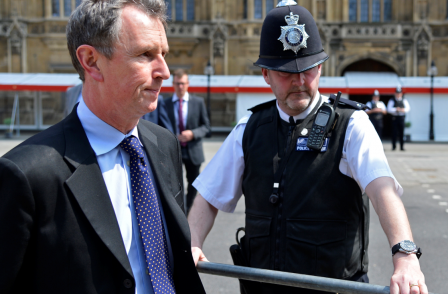
The latest high-profile individuals identified in the media after being arrested on suspicon of sexual assaults were not named by police, Press Gazette has learned.
Tory deputy speaker Nigel Evans was arrested over the weekend and questioned over allegations of rape made by two men (claims which he staunchly denies) and news broke today of the arrest of comedian Jimmy Tarbuck over an allegation of sexual assault dating back to the 1970s.
Neither Lancashire nor North Yorkshire Police confirmed the names of the men arrested although both have been widely reported across print and online media. The arrests came just days after the Association of Chief Police Officers said that names could be confirmed on arrest if doing so could prevent or detect further crimes.
It has been reported that 11 further complainants came forward in the wake of publicity around Stuart Hall's arrest. And in the case of Jimmy Savile, hundreds more alleged victims came forward after his identity was made public.
Evans’ arrest was reported in several Sunday papers which ran pictures of police officers outside his Lancashire house and of him being driven away from a police station.
A spokesman for Lancashire Police said: "We don't name people on arrest but do on charge. We do not confirm names that are put to us."
Tarbuck’s name has not been officially revealed, despite widespread reporting. A spokesperson for North Yorkshire Police said the force had not confirmed reports with any journalist.
“They always ask because that’s what they do,” added the spokesperson, adding: “We’re not going to get drawn into this.”
ACPO is consulting with police forces and journalists over new guidelines to avoid further confusion about when suspects’ details can be released following a number of high-profile cases.
Current ACPO guidelines say that names of suspects will only be released in specific circumstances such as a serious public interest. Although the new guidance is not expected to deviate markedly from this line, ACPO said it was hoped they would “provide clear direction to avoid inconsistencies where some police forces confirm details of an arrested individual if journalists have gathered the information from other sources”.
In a letter to The Times, chief constable Andy Trotter of ACPO’s communications advisory group, said: “There is nothing in proposed guidance to police forces that prevents the name of someone who has been arrested being confirmed by police where a clear policing or public purpose exists.”
Writing in Press Gazette last week Trotter said: "What we are proposing is that forces in
In last year’s inquiry into press standards, Lord Justice Leveson recommended that suspects should not be named when arrested. But one of his chief advisors this weekend expressed concern about this.
Speaking on the Andrew Marr Show on Sunday, Shami Chakrabarti, director of civil rights group Liberty, said there was a “need for discretion when deciding what to say about arresting suspects… because there are times when it’s very important and in the public interest”.
Email pged@pressgazette.co.uk to point out mistakes, provide story tips or send in a letter for publication on our "Letters Page" blog
